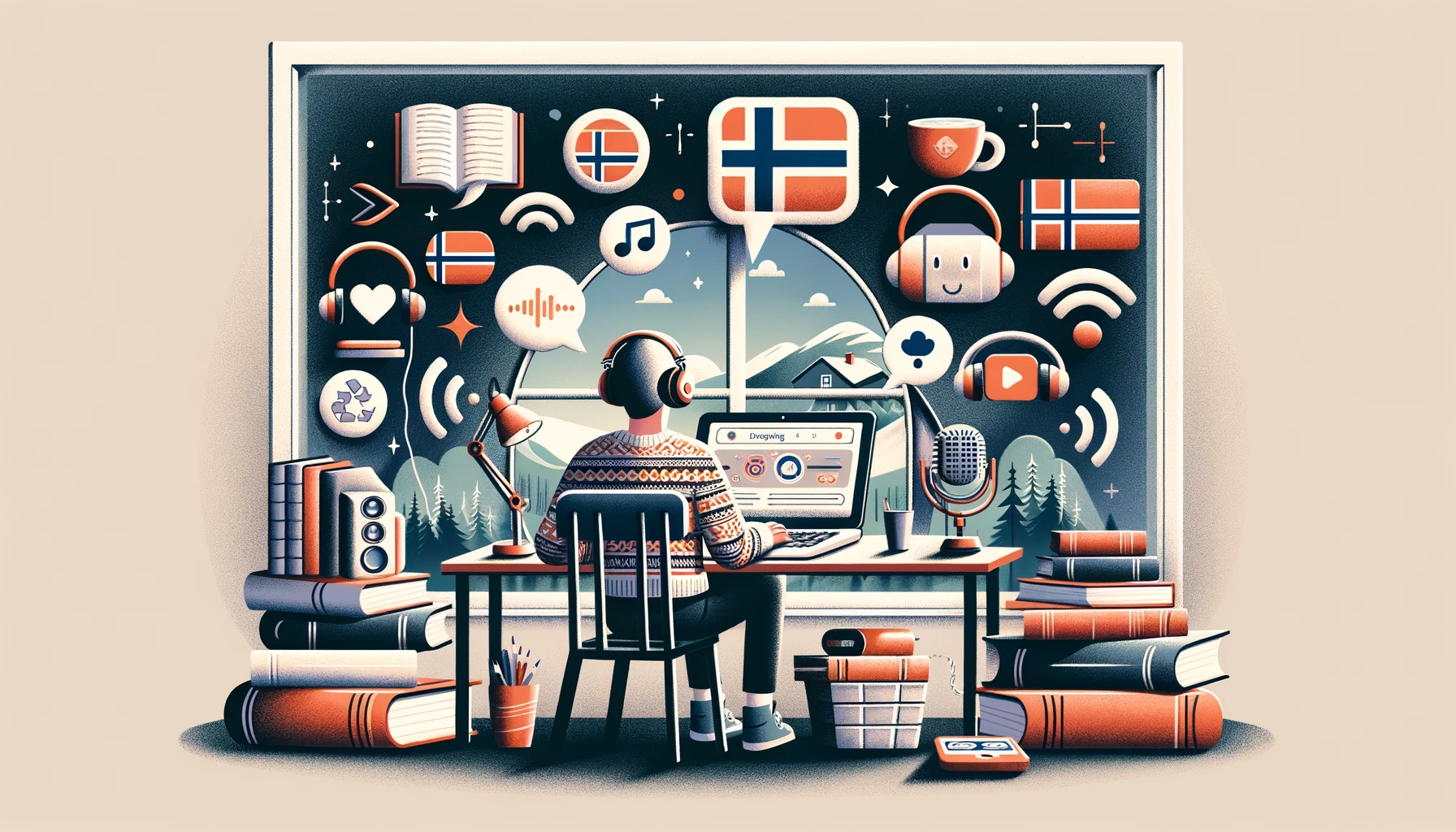Building the foundation
I learned the basics of the Norwegian language by reading and listening to content in simple Norwegian. After several months, I was able to understand authentic content created for native speakers.

After three months of playing with Norwegian, I decided to take learning the language more seriously and step it up a notch. I wanted to reach a level where I could understand Norwegian media and have a normal conversation. I was interested in communication, not linguistic perfection.
Secret weapon
My previous experience with learning English and French informed my strategy for learning Norwegian. I knew I needed to focus on comprehension in the beginning. Fluency in speaking would come later, based on the ability to understand the language. Building that foundation required spending enough time listening to and reading Norwegian content that was both simple enough for me to understand its general meaning and challenging enough to expand my language skills.
At this point, I replaced Duolingo with another app - LingQ. Basically, this app is a repository of learning resources that are matched to your interests and current language level. The lessons include both audio recordings and transcriptions. You can listen and read at the same time. This powerful combination accelerates your learning process. In addition, LingQ allows you to quickly check the meaning of new words or phrases, register words you are learning and words you have already learned, and has several other useful features such as detailed statistics of learning activity or importing content from external sources. This app has all the features you need to develop your listening skills: text and audio materials at your current level, tools to help you understand the content, and specific measures to track your progress. LingQ is my secret weapon in language learning.
Simple stories
Short stories in very basic Norwegian were the first category of content I consumed in large quantities. In the beginning, I knew a few basic words that I had learned with Duolingo. Similarities between Norwegian and English allowed me to understand some words and phrases. However, most of the vocabulary was completely new to me. I learned new words by discovering their meaning in the context of stories. Every day I spent 15-30 minutes on concentrated study. During each study session, I listened and read the lessons on LingQ at the same time, checking the meaning of new words as I went through the story. I also used moments when my hands were busy but my mind was free to listen to audio recordings of these stories. I turned cooking, cleaning my room, and commuting into study time. This strategy gave me a lot of "free" exposure to the Norwegian language that did not cost me any extra time.
I listened again and again to such exciting stories as "Frederik pusser tenner" (Frederik brushes his teeth) or "Kari åpner vinduet" (Kari opens the window). They were not exciting. The story about a guy brushing his teeth was boring the first time I read and heard it, and after 20 repetitions I was sick of it. But it worked. I picked up new vocabulary very quickly. I also got an intuitive feel for basic grammar. My motivation was kept up by the progress I was making, as evidenced by the increasing number of known words in my statistics on LingQ and the fact that I was understanding more and more difficult stories. Perceptions of growing competence counterbalanced feelings of boredom. I enjoyed the learning process.
Podcast
It took me less than 3 months to complete all the beginner lessons on LingQ. Unfortunately, this app does not have a lot of material for the Norwegian language. However, it was enough to get the gist of the more advanced content. I continued to listen to simple stories while I was doing something else, but I dedicated my time for concentrated study to learning with a podcast for intermediate learners - Lær norsk nå. On LingQ I found lessons with audio and transcriptions of each episode.
Later I found more podcasts for Norwegian learners, but "Lær norsk nå" is still my favorite. The author uses very simple vocabulary. He speaks slowly and clearly, like a friendly Norwegian talking to a foreigner who hasn't yet mastered the language. Despite the simplicity of the language, this podcast is really interesting. I enjoyed the content. For me it was not only a good language learning material, but also a relevant source of knowledge about Norway, its culture and history.
It is difficult to understand anything when you jump directly from the basics to authentic content made for native speakers. Podcasts that present meaningful and interesting information in simplified language can be a bridge between beginner material and real-life Norwegian.
Every day I spent some time listening and reading Norwegian content for beginners or intermediate learners. I reached a level where I could enjoy reading, listening and watching authentic Norwegian content after less than six months of systematic learning with short stories and transcribed episodes of "Lær norsk nå" on LingQ.

